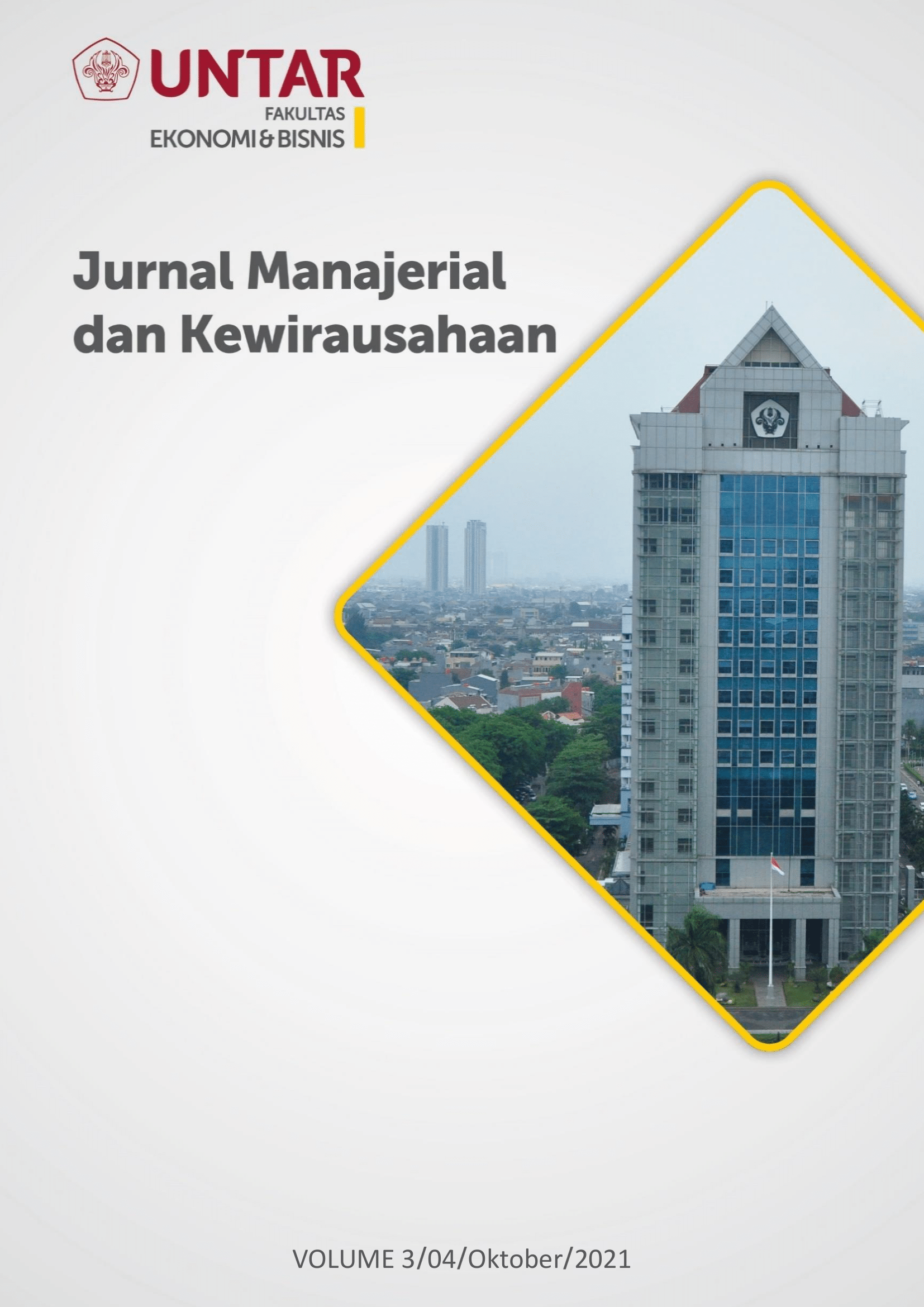Pengaruh Organizational Learning Culture Terhadap Employee Performance Dengan Job Satisfaction Sebagai Mediasi
Main Article Content
Abstract
This study aims to determine the role of job satisfaction in mediating the relationship between organizational learning culture and employee performance. The subjects studied were the employees at PT XYZ which is an import agent company as well as a complete supplier of factory doors and warehouse needs in Indonesia. The number of samples taken in this study were 85 employees and 15 supervisors who were obtained by distributing questionnaires through google form with Non-probability sampling technique. The collected data is processed using SmartPLS. The results of data processing indicate that organizational learning culture has a positive effect on job satisfaction, job satisfaction has a positive effect on employee performance. However, the function of job satisfaction as a mediating variable in this study was not achieved because the correlation value with mediation is smaller than the value of organizational learning culture which can directly have a positive effect on employee performance. So the employee performance in this study is a partial mediation.
Penelitian ini bertujuan untuk mengetahui Peranan Kepuasan Kerja sebagai Mediasi Hubungan antara Budaya Belajar Organisasi dan Kinerja Karyawan. Subjek yang diteliti adalah karyawan pada PT XYZ yang merupakan perusahaan agen import serta penyedia pintu pabrik dan kebutuhan gudang secara lengkap di Indonesia. Jumlah sampel yang diambil pada penelitian ini adalah karyawan dengan jumlah 85 orang dan supervisor 15 orang yang diperoleh dengan menyebar kuesioner melalui google form dengan teknik pengambilan sampel jenuh/sensus. Data yang telah dikumpulkan diolah menggunakan SmartPLS. Hasil dari pengolahan data menunjukkan bahwa budaya belajar organisasi berpengaruh positif terhadap kepuasan kerja, kepuasan kerja berpengaruh positif terhadap kinerja karyawan. Namun, fungsi kepuasan kerja sebagai variabel mediasi pada penelitian ini tidak tercapai karena nilai kolerasi dengan adanya mediasi lebih kecil daripada nilai budaya belajar organisasi yang secara langsung dapat berpengaruh positif terhadap kinerja karyawan. Maka kinerja karyawan disini merupakan mediasi parsial.
Article Details
Section
This work is licensed under a Jurnal Muara Ilmu Ekonomi dan Bisnis Creative Commons Attribution-ShareAlike 4.0 International License.,/p>
References
Baek-Kyoo, Joo & Kathryn, J. (2012). Career satisfaction: The influences of proactive personality, performance goal orientation, organizational learning culture, and leader-member exchange quality. Career Development International, 17(3), 276–295.
Blau, P. M. (1964). Exchange and power in social life. New York: Wiley & Sons.
Cropanzano, R. and Mitchell, M.S. (2005). Social exchange theory: an interdisciplinary review. Journal of Management, 31(6), 874-900.
Dessler, G. (2011). Human Resource Management. 12th Edition. New Jersey: Pearson Prentice Hall.
Dessler, G. (2015). Fundamentals of Human Resource Management. 4th Edition, Global Edition, Pearson International.
Devonish, D. (2018). Effort-reward imbalance at work: the role of job satisfaction. Personnel Review, 47(2), 319-333. doi:10.1108/PR-08-2016-0218
Fake, H. and Dabbagh, N. (2020). Personalized learning within online workforce learning environments: exploring implementations, obstacles, opportunities, and perspectives of workforce leaders. Technology, Knowledge and Learning, 25, 789-809.
Hair, J. et al. (2013). Multivariate Data Analysis (7th ed.). Pearson Education Limited.
Hamner, W. Clay and D. Organ, (2005). Organizational Behavior. Dallas: Business Publications.
Hendri, M. I. (2019). The mediation effect of job satisfaction and organizational commitment on the organizational learning effect of the employee performance. International Journal of Productivity and Performance Management, 68(7), 1208-1234.
Jayathilake, H. D., Daud, D., Eaw, H. C. and Annuar, N. (2021). Employee development and retention of Generation-Z employees in the post-COVID-19 workplace: a conceptual framework. Benchmarking: An International Journal. doi:10.1108/BIJ-06-2020-0311
Jerome, N. (2013). Application of the Maslow’s hierarchy of need theory; impacts and implications on organizational culture, human resource and employee’s performance. International Journal of Business and Management Invention, 2(3), 39-45.
Kinicki, Angelo and R. Kreitner, (2005). Organizational Behavior Key concepts skills and best Practice. New York: Mc Graw-Hill.
Li, Y., Mehmood, K., Zhang, X. and Crossin, C.M. (2019). A Multilevel Study of Leaders’ Emotional Labor on Servant Leadership and Job Satisfaction. Emotions and Leadership (Research on Emotion in Organizations). 15, Emerald Publishing Limited, Bingley, 47-67. doi:10.1108/S1746-979120190000015008
Park, S. and Doo, M. Y. (2020). The effect of organizational culture and HR practices on female managers’ commitment and job satisfaction. European Journal of Training and Development, 44(2/3), 105-120. doi:10.1108/EJTD-03-2019-0045
Robbins, S. P. and Judge, T. A. (2013). Organisational Behavior (15th ed.). Boston: Pearson.
Sahoo, S. (2021). Lean practices and operational performance: the role of organizational culture. International Journal of Quality & Reliability Management. doi:10.1108/IJQRM-03-2020-0067
Singh, S., Kodwani, A. D. and Agrawal, R. K. (2013). Role of lifestyle orientation and perceived organizational functioning in psychological empowerment of IT professionals. Benchmarking: An International Journal, 20(3), 396-418.
Soomro, B.A. and Shah, N. (2019). Determining the impact of entrepreneurial orientation and organizational culture on job satisfaction, organizational commitment, and employee’s performance. South Asian Journal of Business Studies, 8(3), 266-282. doi:10.1108/SAJBS-12-2018-0142
Tran, Q. H. N. (2021). Organisational culture, leadership behaviour and job satisfaction in the Vietnam context. International Journal of Organizational Analysis, 29(1), 136-154. doi:10.1108/IJOA-10-2019-1919
Wallace, Patricia, Jeffrey H. Goldstein, Peter Nathan, (2007). Introduction to Psychology. Dubuque, IA: Wm. C. Brown.
Yanuar. (2017). Compensation, Motivation and Performance of Employees: Evidence from Indonesia. International Journal of Economic Perspectives,11(4), 486-492.
Yanuar, Yenny, L., Ronnie, R. M. (2019). Job Performance and Government Banks: Evidence from Indonesia. International Journal of Innovation, Creativity and Change, 6(11).

